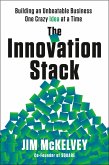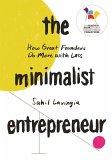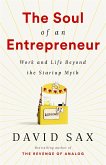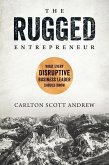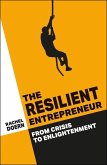- Broschiertes Buch
- Merkliste
- Auf die Merkliste
- Bewerten Bewerten
- Teilen
- Produkt teilen
- Produkterinnerung
- Produkterinnerung
This book presents the economic theories with regards to the entrepreneur of yesterday and those of more recent years, on which issue research has been developing exponentially since the last third of the 20th Century. Much of this book will be devoted to contemporary theories.
Andere Kunden interessierten sich auch für
![The Pumpkin Plan The Pumpkin Plan]() Mike MichalowiczThe Pumpkin Plan35,99 €
Mike MichalowiczThe Pumpkin Plan35,99 €![The Innovation Stack: Building an Unbeatable Business One Crazy Idea at a Time The Innovation Stack: Building an Unbeatable Business One Crazy Idea at a Time]() Jim McKelveyThe Innovation Stack: Building an Unbeatable Business One Crazy Idea at a Time19,99 €
Jim McKelveyThe Innovation Stack: Building an Unbeatable Business One Crazy Idea at a Time19,99 €![The Minimalist Entrepreneur The Minimalist Entrepreneur]() Sahil LavingiaThe Minimalist Entrepreneur23,99 €
Sahil LavingiaThe Minimalist Entrepreneur23,99 €![The Soul of an Entrepreneur The Soul of an Entrepreneur]() David SaxThe Soul of an Entrepreneur21,99 €
David SaxThe Soul of an Entrepreneur21,99 €![The Rugged Entrepreneur The Rugged Entrepreneur]() Scott AndrewThe Rugged Entrepreneur33,99 €
Scott AndrewThe Rugged Entrepreneur33,99 €![The Resilient Entrepreneur The Resilient Entrepreneur]() Rachel DoernThe Resilient Entrepreneur29,99 €
Rachel DoernThe Resilient Entrepreneur29,99 €![The Introvert Entrepreneur The Introvert Entrepreneur]() Beth BuelowThe Introvert Entrepreneur23,99 €
Beth BuelowThe Introvert Entrepreneur23,99 €-
-
-
This book presents the economic theories with regards to the entrepreneur of yesterday and those of more recent years, on which issue research has been developing exponentially since the last third of the 20th Century. Much of this book will be devoted to contemporary theories.
Produktdetails
- Produktdetails
- Verlag: ISTE Ltd
- Seitenzahl: 144
- Erscheinungstermin: 19. Dezember 2016
- Englisch
- Abmessung: 231mm x 155mm x 10mm
- Gewicht: 238g
- ISBN-13: 9781786300539
- ISBN-10: 1786300532
- Artikelnr.: 45191863
- Herstellerkennzeichnung
- Libri GmbH
- Europaallee 1
- 36244 Bad Hersfeld
- gpsr@libri.de
- Verlag: ISTE Ltd
- Seitenzahl: 144
- Erscheinungstermin: 19. Dezember 2016
- Englisch
- Abmessung: 231mm x 155mm x 10mm
- Gewicht: 238g
- ISBN-13: 9781786300539
- ISBN-10: 1786300532
- Artikelnr.: 45191863
- Herstellerkennzeichnung
- Libri GmbH
- Europaallee 1
- 36244 Bad Hersfeld
- gpsr@libri.de
Sophie BOUTILLIER is an economist and sociologist. She is Associated Professor and researcher in Economics at the University of Littoral Côte d'Opale, France, and is currently Vice President of the Research Network on Innovation. Dimitri UZUNIDIS is Professor in Political Economy. He is currently President of the Research Network on Innovation in Paris, France.
Foreword ix
Introduction xiii
Chapter 1 From Term to Concept: the Entrepreneur and his Economic Function
1
1.1 Etymological and conceptual bases of the entrepreneur 1
1.2 The gradual recognition of the role of entrepreneurship 8
1.3 From a society of salary-earners to one of entrepreneurs? 9
1.4 Current definitions of entrepreneurship, or the institutional
recognition of the entrepreneur 17
1.5 The plural entrepreneur 19
Chapter 2 Quantifying Entrepreneurship, Understanding the Entrepreneurial
Role 21
2.1 Basic principles: the OECD's model 21
2.2 The main entrepreneurship indicators 24
2.2.1 Eurostat indicators 24
2.2.2 OECD and Eurostat indicators 24
2.2.3 Global Entrepreneurship Monitor indicators 25
2.2.4 World Bank indicators and the business climate 28
2.2.5 The official quantification of business creation in France: the
Business Creation Observatory 29
2.3 The European Union's inclusive policy to promote entrepreneurship 30
2.4 Supporting entrepreneurship in developing countries: the ambitions of
the United Nations (UN) and the United States 31
Chapter 3 Classical Economics of the Entrepreneur 35
3.1 Richard Cantillon: an economic agent with uncertain income 35
3.2 Anne Robert Jacques Turgot: the "progress" of the capitalist
entrepreneur 36
3.3 François Quesnay, the manufacturing and commercial entrepreneur belongs
to the sterile class 38
3.4 Pietro Verri and Cesare Beccaria, the inspiration for Jean-Baptiste
Say? 38
3.5 Adam Smith: sympathy for initiative, but distrust of project creators
40
3.6 Jean-Baptiste Say: intermediary between scholar and laborer 42
3.7 Karl Marx, entrepreneur or officer of capital 46
3.8 Jean-Gustave Courcelle Seneuil, economistentrepreneur or
entrepreneur-economist? 47
3.9 The marginalists' faux pas or Léon Walras's ghost entrepreneur 51
3.10 Alfred Marshall, division of industry into entrepreneurial and
managerial businesses 56
3.11 Werner Sombart and Max Weber, the entrepreneur or the spirit of
capitalism 58
3.12 Joseph A Schumpeter: the entrepreneur's "new combinations of
production factors" 60
3.13 John Maynard Keynes: the animal spirit of the entrepreneur 65
3.14 From uncertainty to ignorance: Ludwig von Mises, Franck Knight and
Friedrich Hayek 67
3.15 Creating or detecting opportunities? 69
Chapter 4 Contemporary Theories of the Entrepreneur 73
4.1 From entrepreneur to industrial economy 73
4.2 Ronald Coase, or the entrepreneur on the frontier of industrial
economics 75
4.3 William Baumol, the entrepreneur and the Prince of Denmark 77
4.4 Mark Casson: entrepreneurship - an alternative to employment? 79
4.5 Scott Shane or the genetic theory of the entrepreneur 83
4.6 Entrepreneur, innovation, territory and social networks 85
4.7 Mark Granovetter - from social integration to weighted networks 88
4.8 Towards an evolutionist theory of the entrepreneur, or the
heterogeneity of entrepreneurship 90
Chapter 5 Towards a Socioeconomics of the Entrepreneur: An Overview 93
5.1 The 13 keywords of the economics of the entrepreneur 93
5.2 On the entrepreneur's personality: the player and the system 95
5.3 Resource potential and the social integration of the entrepreneur 100
5.4 Overall picture of the theory of the entrepreneur 103
Conclusion 109
Bibliography 111
Index 123
Introduction xiii
Chapter 1 From Term to Concept: the Entrepreneur and his Economic Function
1
1.1 Etymological and conceptual bases of the entrepreneur 1
1.2 The gradual recognition of the role of entrepreneurship 8
1.3 From a society of salary-earners to one of entrepreneurs? 9
1.4 Current definitions of entrepreneurship, or the institutional
recognition of the entrepreneur 17
1.5 The plural entrepreneur 19
Chapter 2 Quantifying Entrepreneurship, Understanding the Entrepreneurial
Role 21
2.1 Basic principles: the OECD's model 21
2.2 The main entrepreneurship indicators 24
2.2.1 Eurostat indicators 24
2.2.2 OECD and Eurostat indicators 24
2.2.3 Global Entrepreneurship Monitor indicators 25
2.2.4 World Bank indicators and the business climate 28
2.2.5 The official quantification of business creation in France: the
Business Creation Observatory 29
2.3 The European Union's inclusive policy to promote entrepreneurship 30
2.4 Supporting entrepreneurship in developing countries: the ambitions of
the United Nations (UN) and the United States 31
Chapter 3 Classical Economics of the Entrepreneur 35
3.1 Richard Cantillon: an economic agent with uncertain income 35
3.2 Anne Robert Jacques Turgot: the "progress" of the capitalist
entrepreneur 36
3.3 François Quesnay, the manufacturing and commercial entrepreneur belongs
to the sterile class 38
3.4 Pietro Verri and Cesare Beccaria, the inspiration for Jean-Baptiste
Say? 38
3.5 Adam Smith: sympathy for initiative, but distrust of project creators
40
3.6 Jean-Baptiste Say: intermediary between scholar and laborer 42
3.7 Karl Marx, entrepreneur or officer of capital 46
3.8 Jean-Gustave Courcelle Seneuil, economistentrepreneur or
entrepreneur-economist? 47
3.9 The marginalists' faux pas or Léon Walras's ghost entrepreneur 51
3.10 Alfred Marshall, division of industry into entrepreneurial and
managerial businesses 56
3.11 Werner Sombart and Max Weber, the entrepreneur or the spirit of
capitalism 58
3.12 Joseph A Schumpeter: the entrepreneur's "new combinations of
production factors" 60
3.13 John Maynard Keynes: the animal spirit of the entrepreneur 65
3.14 From uncertainty to ignorance: Ludwig von Mises, Franck Knight and
Friedrich Hayek 67
3.15 Creating or detecting opportunities? 69
Chapter 4 Contemporary Theories of the Entrepreneur 73
4.1 From entrepreneur to industrial economy 73
4.2 Ronald Coase, or the entrepreneur on the frontier of industrial
economics 75
4.3 William Baumol, the entrepreneur and the Prince of Denmark 77
4.4 Mark Casson: entrepreneurship - an alternative to employment? 79
4.5 Scott Shane or the genetic theory of the entrepreneur 83
4.6 Entrepreneur, innovation, territory and social networks 85
4.7 Mark Granovetter - from social integration to weighted networks 88
4.8 Towards an evolutionist theory of the entrepreneur, or the
heterogeneity of entrepreneurship 90
Chapter 5 Towards a Socioeconomics of the Entrepreneur: An Overview 93
5.1 The 13 keywords of the economics of the entrepreneur 93
5.2 On the entrepreneur's personality: the player and the system 95
5.3 Resource potential and the social integration of the entrepreneur 100
5.4 Overall picture of the theory of the entrepreneur 103
Conclusion 109
Bibliography 111
Index 123
Foreword ix
Introduction xiii
Chapter 1 From Term to Concept: the Entrepreneur and his Economic Function
1
1.1 Etymological and conceptual bases of the entrepreneur 1
1.2 The gradual recognition of the role of entrepreneurship 8
1.3 From a society of salary-earners to one of entrepreneurs? 9
1.4 Current definitions of entrepreneurship, or the institutional
recognition of the entrepreneur 17
1.5 The plural entrepreneur 19
Chapter 2 Quantifying Entrepreneurship, Understanding the Entrepreneurial
Role 21
2.1 Basic principles: the OECD's model 21
2.2 The main entrepreneurship indicators 24
2.2.1 Eurostat indicators 24
2.2.2 OECD and Eurostat indicators 24
2.2.3 Global Entrepreneurship Monitor indicators 25
2.2.4 World Bank indicators and the business climate 28
2.2.5 The official quantification of business creation in France: the
Business Creation Observatory 29
2.3 The European Union's inclusive policy to promote entrepreneurship 30
2.4 Supporting entrepreneurship in developing countries: the ambitions of
the United Nations (UN) and the United States 31
Chapter 3 Classical Economics of the Entrepreneur 35
3.1 Richard Cantillon: an economic agent with uncertain income 35
3.2 Anne Robert Jacques Turgot: the "progress" of the capitalist
entrepreneur 36
3.3 François Quesnay, the manufacturing and commercial entrepreneur belongs
to the sterile class 38
3.4 Pietro Verri and Cesare Beccaria, the inspiration for Jean-Baptiste
Say? 38
3.5 Adam Smith: sympathy for initiative, but distrust of project creators
40
3.6 Jean-Baptiste Say: intermediary between scholar and laborer 42
3.7 Karl Marx, entrepreneur or officer of capital 46
3.8 Jean-Gustave Courcelle Seneuil, economistentrepreneur or
entrepreneur-economist? 47
3.9 The marginalists' faux pas or Léon Walras's ghost entrepreneur 51
3.10 Alfred Marshall, division of industry into entrepreneurial and
managerial businesses 56
3.11 Werner Sombart and Max Weber, the entrepreneur or the spirit of
capitalism 58
3.12 Joseph A Schumpeter: the entrepreneur's "new combinations of
production factors" 60
3.13 John Maynard Keynes: the animal spirit of the entrepreneur 65
3.14 From uncertainty to ignorance: Ludwig von Mises, Franck Knight and
Friedrich Hayek 67
3.15 Creating or detecting opportunities? 69
Chapter 4 Contemporary Theories of the Entrepreneur 73
4.1 From entrepreneur to industrial economy 73
4.2 Ronald Coase, or the entrepreneur on the frontier of industrial
economics 75
4.3 William Baumol, the entrepreneur and the Prince of Denmark 77
4.4 Mark Casson: entrepreneurship - an alternative to employment? 79
4.5 Scott Shane or the genetic theory of the entrepreneur 83
4.6 Entrepreneur, innovation, territory and social networks 85
4.7 Mark Granovetter - from social integration to weighted networks 88
4.8 Towards an evolutionist theory of the entrepreneur, or the
heterogeneity of entrepreneurship 90
Chapter 5 Towards a Socioeconomics of the Entrepreneur: An Overview 93
5.1 The 13 keywords of the economics of the entrepreneur 93
5.2 On the entrepreneur's personality: the player and the system 95
5.3 Resource potential and the social integration of the entrepreneur 100
5.4 Overall picture of the theory of the entrepreneur 103
Conclusion 109
Bibliography 111
Index 123
Introduction xiii
Chapter 1 From Term to Concept: the Entrepreneur and his Economic Function
1
1.1 Etymological and conceptual bases of the entrepreneur 1
1.2 The gradual recognition of the role of entrepreneurship 8
1.3 From a society of salary-earners to one of entrepreneurs? 9
1.4 Current definitions of entrepreneurship, or the institutional
recognition of the entrepreneur 17
1.5 The plural entrepreneur 19
Chapter 2 Quantifying Entrepreneurship, Understanding the Entrepreneurial
Role 21
2.1 Basic principles: the OECD's model 21
2.2 The main entrepreneurship indicators 24
2.2.1 Eurostat indicators 24
2.2.2 OECD and Eurostat indicators 24
2.2.3 Global Entrepreneurship Monitor indicators 25
2.2.4 World Bank indicators and the business climate 28
2.2.5 The official quantification of business creation in France: the
Business Creation Observatory 29
2.3 The European Union's inclusive policy to promote entrepreneurship 30
2.4 Supporting entrepreneurship in developing countries: the ambitions of
the United Nations (UN) and the United States 31
Chapter 3 Classical Economics of the Entrepreneur 35
3.1 Richard Cantillon: an economic agent with uncertain income 35
3.2 Anne Robert Jacques Turgot: the "progress" of the capitalist
entrepreneur 36
3.3 François Quesnay, the manufacturing and commercial entrepreneur belongs
to the sterile class 38
3.4 Pietro Verri and Cesare Beccaria, the inspiration for Jean-Baptiste
Say? 38
3.5 Adam Smith: sympathy for initiative, but distrust of project creators
40
3.6 Jean-Baptiste Say: intermediary between scholar and laborer 42
3.7 Karl Marx, entrepreneur or officer of capital 46
3.8 Jean-Gustave Courcelle Seneuil, economistentrepreneur or
entrepreneur-economist? 47
3.9 The marginalists' faux pas or Léon Walras's ghost entrepreneur 51
3.10 Alfred Marshall, division of industry into entrepreneurial and
managerial businesses 56
3.11 Werner Sombart and Max Weber, the entrepreneur or the spirit of
capitalism 58
3.12 Joseph A Schumpeter: the entrepreneur's "new combinations of
production factors" 60
3.13 John Maynard Keynes: the animal spirit of the entrepreneur 65
3.14 From uncertainty to ignorance: Ludwig von Mises, Franck Knight and
Friedrich Hayek 67
3.15 Creating or detecting opportunities? 69
Chapter 4 Contemporary Theories of the Entrepreneur 73
4.1 From entrepreneur to industrial economy 73
4.2 Ronald Coase, or the entrepreneur on the frontier of industrial
economics 75
4.3 William Baumol, the entrepreneur and the Prince of Denmark 77
4.4 Mark Casson: entrepreneurship - an alternative to employment? 79
4.5 Scott Shane or the genetic theory of the entrepreneur 83
4.6 Entrepreneur, innovation, territory and social networks 85
4.7 Mark Granovetter - from social integration to weighted networks 88
4.8 Towards an evolutionist theory of the entrepreneur, or the
heterogeneity of entrepreneurship 90
Chapter 5 Towards a Socioeconomics of the Entrepreneur: An Overview 93
5.1 The 13 keywords of the economics of the entrepreneur 93
5.2 On the entrepreneur's personality: the player and the system 95
5.3 Resource potential and the social integration of the entrepreneur 100
5.4 Overall picture of the theory of the entrepreneur 103
Conclusion 109
Bibliography 111
Index 123



